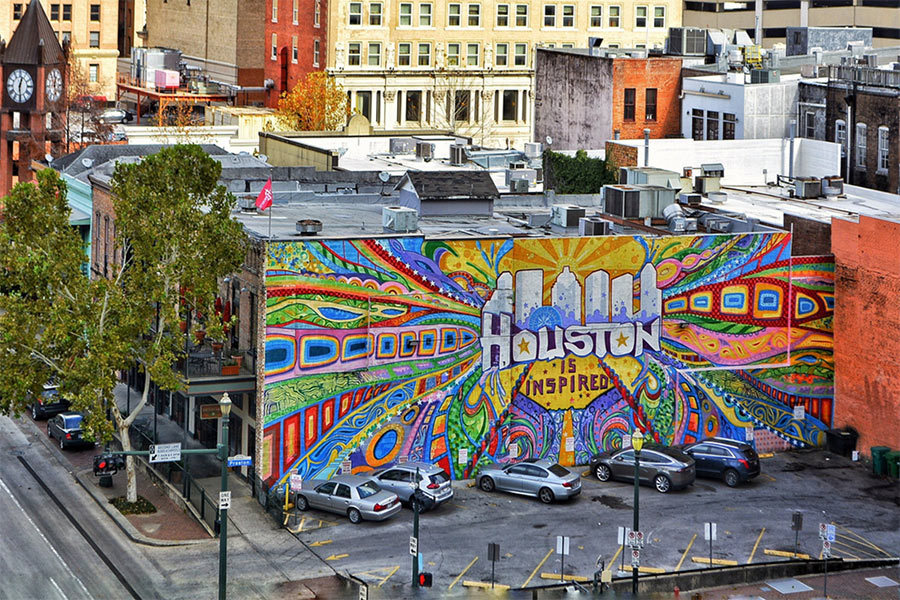
- Stream Realty Partners To Break Ground on Dual-Building Bayou Bend Business Park on Beltway 8 Near Hwy. 90 This Month [Houston Business Journal]
- Downtown, University of Houston, IAH, Hobby Among Popular Uber Destinations [The Highwayman]
- Houston Skyline To Dim This Weekend as 134M SF of Downtown Office Space Participates in Lights Out Houston [Prime Property]
- City Council Approves Ordinance That Allows City To Rehab and Resell Blighted Properties [Houston Public Media]
- Houston’s First Ward is Flourishing, But Not Without Some Friction [Houston Chronicle ($)]
- Montrose’s Siphon Coffee To Open in the Next Few Weeks on West Alabama [Eater Houston; previously on Swamplot]
- Former Philippe Restaurant To Reopen as Table on May 15 at 1800 Post Oak Blvd. [Food Chronicles]
- Closings Planned This Weekend for Work on Opposite Ends of Grand Parkway Segment [The Highwayman]
- Thousands of Volunteers To Restore 18-Year-Old Mural Along 2.5 Miles of the Seawall [Galveston County Daily News ($)]
- Women’s Boutique Elizabeth Anthony Cutting Esther Wolf’s Name, Adding on David Brown’s Space in Uptown Park [Culturemap]
- Can You Identify the Art in this $4.25M Glassman Shoemake Maldonado Home in River Oaks? [The Great God Pan Is Dead]
- Artist Behind Prada Marfa Vandalization To Stand Trial Next Friday [Glasstire]
Photo of Allen Pkwy. sunset: Russell Hancock via Swamplot Flickr Pool
Headlines





I’d be very wary of the City owning blighted properties. Philadelphia city government owns an enormous number of blighted properties, they almost never fix them up, and they’re very bad about selling them even when they’re in desirable neighborhoods. Just not a proper role of government.
Same thing in New Orleans. The city’s blighted property program is an ineffectual nightmare. The rehab process is very susceptible to incompetence and corruption. Ideally the city should seize the properties and immediately unload them to renovation by private enterprise. But this is easier said than done. I find Mayor Parker’s expansion of government very troubling.
I actually really like the idea of having the City help demolish those buildings before they try to sell the land. What scares a lot of buyers away from these properties is that they would have to foot the cost of demolitions.
.
I do wonder, however, if it’s really necessary for the City to actually do the demolitions itself. Why not identify the properties, and offer a credit to cover to the buyers to cover the cost of demolition – sort of like that $15k per unit credit hey give for apartments downtown. It’s be less work for the City, NAND just as effective if they do it right.
I like the idea behind removing red tape to get these properties taken care of. But, to be done “right” there needs to be involvement from the investor / developer community to shoulder the burden of repairs instead of the city. (Government waste and excessive spending practices do not lend themselves towards fiscally smart remodeling!) I’d love to see something along the lines of the Abandoned Housing Initiative in Massachusetts, with the CoH appointing private developers as Receivers. While the program in Mass is complicated by the need for leins and forclosure proceedings by the appointed Receiver, with the CoH’s program they would be the owners so that step is eliminated.
.
Informarion about the Massachusetts program I am referring to: http://www.mass.gov/ago/doing-business-in-massachusetts/economic-development/abandoned-housing-initiative-ahi/
.
I think if done properly it will be a win-win-win. The CoH gets rid of a blight and an improved property generates additional tax income. The community wins with the removal of a potentially dangerous structure and the improvement boosts the surrounding property values. And, developers / investors win with the ability to get into a project for just the cost of the renovations. Upon sale have them refund the CoH the cost of expenses (listed in the CoH’s Strike Off Program slideshow page 2 as a first priority cost) and maybe even tack on a small percent of the profits from the sale going to the CoH.